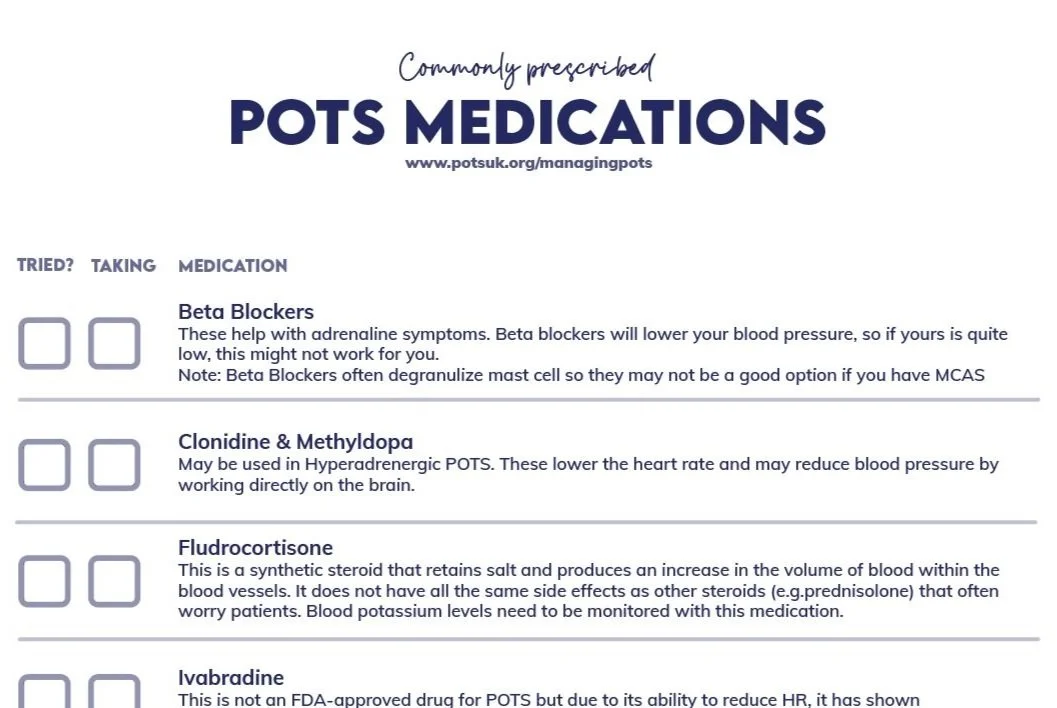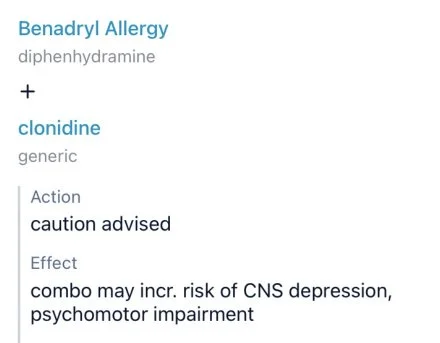Treatments
Most common medications for POTS
Source POTSUK.org
Midodrine: The aim of an alpha agonist is to narrow blood vessels to help return the blood back to the heart. Side effects are high blood pressure and sometimes worsening of symptoms.
Pyridostigmine: Acts at the nervous system to reduce heart rate
Clonidine, Guanfacine, or Methyldopa: These reduce heart rate and blood pressure
Modafinil or other stimulant medication (Adderall, Ritalin, etc.): May improve alertness and decrease mental clouding in those with PoTS.
Ivabradine This is not an FDA-approved drug for POTS but due to its ability to reduce HR, it has shown improvement in POTS patients in many studies
Fludrocortisone: This medication works by upping your blood volume
Beta blockers: These help with adrenaline symptoms. Beta blockers will lower your blood pressure, so if yours is quite low, this might not work for you.
Note: Beta Blockers are often not a perfect choice if you have MCAS but are worth trying if your doctor recommends them.
Medication resources
Epocrates is a free phone app that can point out medication interactions.
They are not sponsored. I personally use them to track my medication interactionsLifestyle changes
-
Exercise training has been proven to expand blood volume & plasma volume & increase cardiac muscle mass &heart size. These in turn have been associated with symptom improvement.
Consistent exercise is proven to be as effective as medication for some people with POTS.
• POTS patients usually fare better with exercises that do not cause orthostatic stress. The CHOP program is recommended for people with POTS.
• Build up the number of minutes exercising very slowly, building up to 30 minutes a days. -
Sleep is important to keep your body working properly.
Patients with POTS have higher subjective daytime sleepiness, fatigue, and worse sleep and health related quality of life. The sleep problems contribute significantly to the diminished quality of life: ∼ 50% of the variability in HRQL can be explained by the variability in sleep problems
The less you sleep, the more severe your symptoms might be. During sleep, your sympathetic nervous system – which controls your fight or flight response – gets a chance to relax. Studies have shown that when we're deprived of sleep, sympathetic nervous system activity increases, which is also mirrored by an increase in blood pressure which can make POTS symptoms worse.
-
A high salt diet of an extra 3-10g of salt per day may be recommended. This has been found to increase circulatory blood volume and therefore lowers heart rate and increases blood pressure.
However, excessive salt can be dangerous in some patients.
-
Increased fluid intake is advised to increase circulatory blood volume, particularly in the morning.
-
Compression tights are sometimes recommended in PoTS, vaso-vagal syncope or orthostatic hypotension. Compression of the lower limbs causes an increased blood return to the heart from the superficial veins in the legs. These help prevent blood pooling. It is recommended to wear items like compression socks.
Note: I personally wear a corset.

